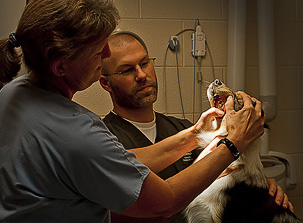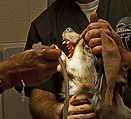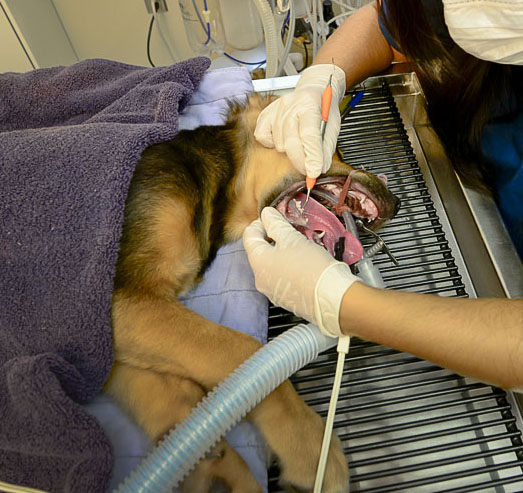SMALL ANIMAL DENTISTRY
Routine and Advanced Dental Services for Dogs and CatsBooking an Appointment is Easy Call (865) 983-3155 (M-F 8a-5:30p, Sat. till noon)!
Dogs in particular tend not to show periodontal pain. They need to be examined yearly starting ages 2-4 (small breeds) or ages 4-6 (large breeds).
ROUTINE PROCEDURES


The Countryside Difference
Each patient receiving a dental cleaning receives blood work. We want to be sure the anesthetic will not adversely affect the animal’s vital organs (heart, liver, etc.). Younger patients receive a comprehensive blood panel, while geriatric patients receive a complete blood count and a more extensive panel, as well as intra-operative IV fluids.
ADVANCED PROCEDURES
Extractions – We perform simple and complicated surgical extractions, from retained deciduous (“baby”) teeth to the large premolars and molars in adult patients.

The Countryside Difference
We offer many advanced services that you may not find elsewhere:
Bone grafting for advanced periodontal disease to preserve the tooth instead of extracting it.
Bonding for a tooth that is fractured but not into the pulp. The bonding sealant preserves the tooth from extraction and adds a protective layer to reduce further damage.
Gingivectomy and gingivoplasty for dogs whose gums have grown too rapidly (gingival hyperplasia). This procedure reduces and reshapes the gingiva, and reduces the likelihood of contracting periodontal disease.
Full treatment for periodontal disease when digital radiographs reveal the extent of disease.
DENTISTRY FOR FELINE PATIENTS
Cats’ mouths need tender loving care, too! We offer the same broad selection of services for feline patients as are available for canine patients.
Full dental radiographs are particularly important in feline patients due to a higher risk of resorptive disease that is often undetectable solely by an oral exam. This disease process is painful and early treatment is the best option.
Cats can also develop gingival stomatitis: a hypersensitivity to tartar on teeth which leads to ulcers adjacent to the teeth. Treatment includes either full mouth extractions, or extraction of teeth adjacent to ulcers.
BRUSHING YOUR PET’S TEETH
Keeping your pet’s teeth clean is so important!
It not only helps combat one of the leading diseases in pets – periodontal disease – but can prevent a host of other health problems that stem from gum disease including damage to other organs such as the heart, liver, and kidneys, and/or lead to other serious health problems. We can supply you with special toothpaste formulated specially for your pet’s taste buds and also help instruct you on the proper application.
